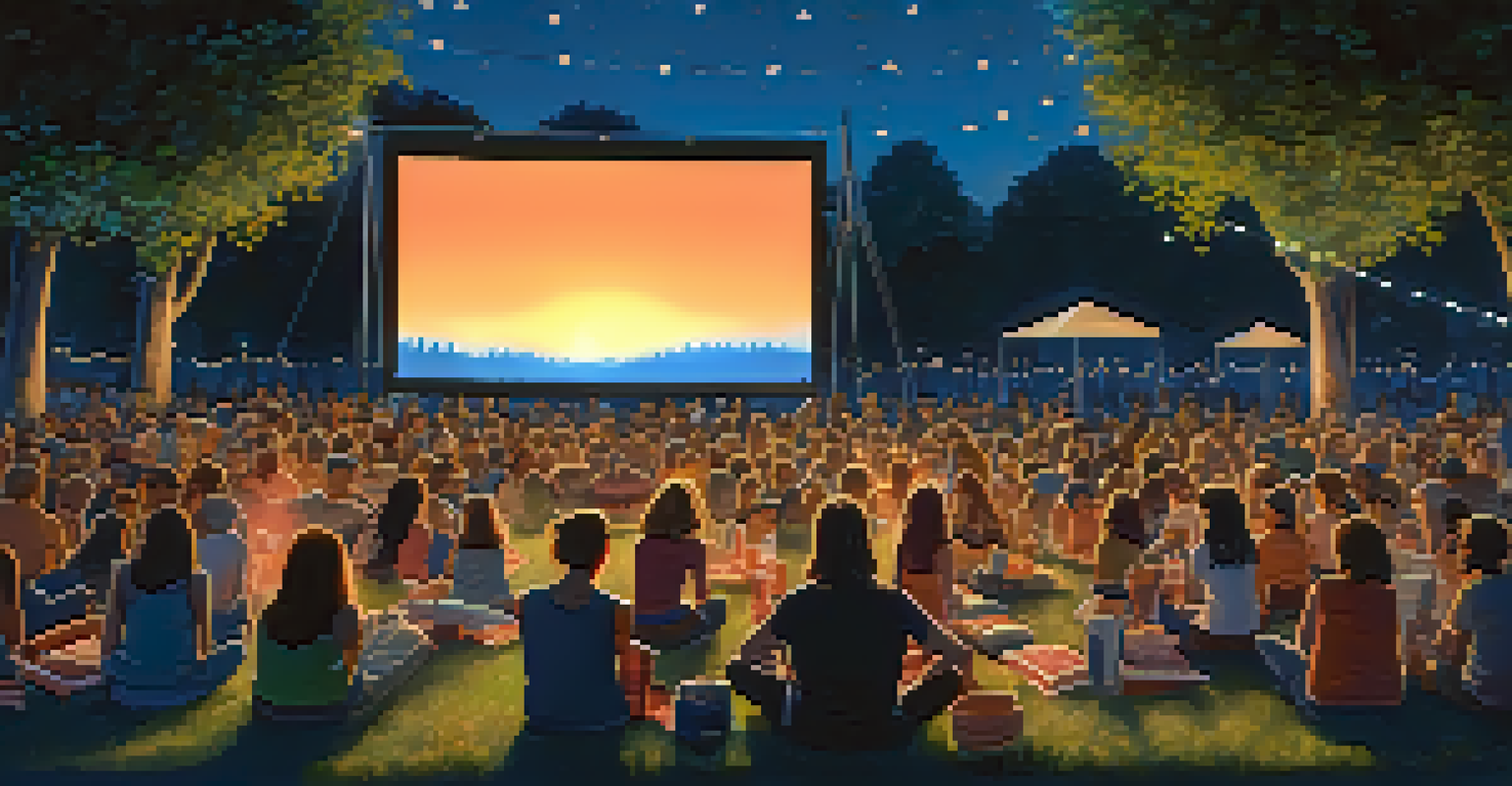The Role of Film Festivals in Hollywood's Global Outreach

A Brief History of Film Festivals in Hollywood
Film festivals have long been a cornerstone of the cinematic world, with Hollywood at their epicenter. The first major festival, the Cannes Film Festival, began in 1946 and inspired others around the globe. These events have since evolved into platforms where filmmakers showcase their work, network, and celebrate diversity in cinema. Over the years, festivals like Sundance and Toronto have also risen to prominence, further enriching Hollywood's cultural landscape.
Film festivals are the perfect opportunity to discover new voices and new stories, and to embrace the eclectic nature of cinema.
As film festivals gained traction, they became essential for independent filmmakers seeking recognition and distribution. They offer a unique opportunity for smaller productions to compete alongside big-budget films, breaking the traditional barriers of the industry. This democratization of cinema allows for diverse voices and stories to shine, which is vital for the continual evolution of film as an art form.
Additionally, festivals have transformed into significant events for talent scouting and marketing. Major studios and distributors often attend these festivals to spot emerging talent and innovative storytelling. This blend of art and commerce has helped forge new paths for films that might otherwise go unnoticed in the mainstream.
Promoting Cultural Exchange Through Cinema
One of the most beautiful aspects of film festivals is their ability to foster cultural exchange. By showcasing films from various countries, they allow audiences to experience different perspectives and narratives. This not only enriches the viewers' understanding of global issues but also cultivates empathy and appreciation for diverse cultures.

For instance, festivals like the Toronto International Film Festival highlight films that tackle pressing social issues, often leading to discussions that transcend borders. These conversations can spark movements and inspire change, showcasing the power of storytelling in unifying people. In this way, film festivals serve as a bridge between Hollywood and the world, promoting dialogue and understanding.
Film Festivals Foster Cultural Exchange
Film festivals serve as vital platforms for showcasing diverse narratives, promoting understanding and empathy among audiences worldwide.
Moreover, many festivals invite international filmmakers to participate, creating an inclusive environment. This exchange of ideas can lead to collaborations that further enhance the richness of global cinema. As a result, viewers benefit from a broader array of films that reflect their realities and challenges, creating a more inclusive film landscape.
Spotlighting Emerging Talent and Innovations
Film festivals are often seen as launching pads for emerging talent. Many directors, actors, and screenwriters gain recognition through their work showcased at these festivals. For example, films like 'Get Out' and 'Moonlight' found their footing at festivals before becoming cultural phenomena and award winners.
Cinema is a matter of what's in the frame and what's out, and that is a matter of a lot of choices, and film festivals help filmmakers make those choices.
By spotlighting new talent, festivals create a space for innovation in storytelling and filmmaking techniques. Filmmakers are encouraged to take risks and explore unconventional narratives, fostering creativity that might not thrive in mainstream settings. This spirit of experimentation has led to groundbreaking films that challenge traditional norms and expand the boundaries of cinema.
Through awards and accolades, festivals also help elevate the profiles of these emerging artists. Winning a prize at a prestigious festival can lead to distribution deals and increased visibility, allowing filmmakers to build on their success. As a result, festivals play a vital role in nurturing the future of the film industry.
The Economic Impact of Film Festivals
Film festivals significantly contribute to local economies, creating jobs and attracting tourism. When festivals take place, they draw large crowds of film enthusiasts, industry professionals, and media, all eager to participate in the cinematic experience. This influx of visitors boosts local businesses, from hotels and restaurants to transportation services.
Moreover, festivals often involve partnerships with local governments and sponsors, creating opportunities for economic development. These collaborations can lead to increased funding for the arts and more resources for filmmakers. As a result, film festivals not only elevate the cultural profile of a region but also stimulate economic growth.
Spotlight on Emerging Filmmakers
These events provide crucial opportunities for new talent to gain recognition, leading to innovation and growth in the film industry.
In the long run, the success of film festivals can lead to a more vibrant film industry in their respective locations. When filmmakers, actors, and industry professionals have access to resources and support, they are more likely to return and create future projects. This cycle of investment and creativity helps solidify the festival's place in the global cinematic landscape.
Leveraging Technology and Digital Platforms
In recent years, technology has transformed the way film festivals operate, particularly with the rise of digital platforms. Streaming services have become essential for reaching wider audiences, allowing festivals to showcase films online. This shift has made it possible for people from different parts of the world to participate, breaking geographical barriers.
For instance, festivals like Tribeca embraced digital screenings, enabling audiences to watch films from the comfort of their homes. This accessibility has democratized the festival experience, allowing more people to engage with films that resonate with them. It has also provided filmmakers with greater exposure, paving the way for international collaborations.
However, the digital shift also poses challenges, such as maintaining the communal experience of watching films together. Striking a balance between in-person and online screenings will be crucial for the future of festivals. Nonetheless, the integration of technology continues to enhance the reach and impact of film festivals in Hollywood and beyond.
Building Lasting Connections Between Filmmakers
Film festivals are not just about showcasing films; they are also about building connections among filmmakers. Networking opportunities abound, as industry professionals gather to share ideas, experiences, and insights. These interactions can lead to collaborations, mentorships, and even lifelong friendships.
For instance, many filmmakers recount stories of how meeting at a festival led to successful partnerships on future projects. The informal setting of festivals encourages open dialogue, allowing creators to discuss their work and exchange feedback. This nurturing environment fosters a sense of community that extends beyond the festival itself.
Economic Boost from Film Festivals
Film festivals significantly enhance local economies by attracting tourism and creating job opportunities in the surrounding communities.
Ultimately, the relationships forged at festivals can have a lasting impact on the careers of filmmakers. These connections can open doors to funding, distribution, and opportunities that might otherwise be out of reach. As such, festivals play an integral role in shaping the professional landscape of cinema.
The Future of Film Festivals in a Globalized World
As the world becomes increasingly interconnected, film festivals will continue to evolve and adapt. The growing importance of global storytelling means that festivals must embrace diverse narratives and perspectives. This shift will likely lead to more inclusive programming and a wider variety of films being showcased.
Moreover, the blending of in-person and digital experiences will shape the future of festivals. By offering hybrid models, festivals can cater to a broader audience, ensuring that more people have access to the films and discussions presented. This adaptability will be key to staying relevant in an ever-changing cinematic landscape.

Ultimately, the role of film festivals in Hollywood's global outreach will remain essential. They will continue to serve as platforms for creativity, cultural exchange, and economic impact, further solidifying their place in the world of cinema. As filmmakers and audiences alike embrace this evolution, the future of film festivals looks bright and promising.